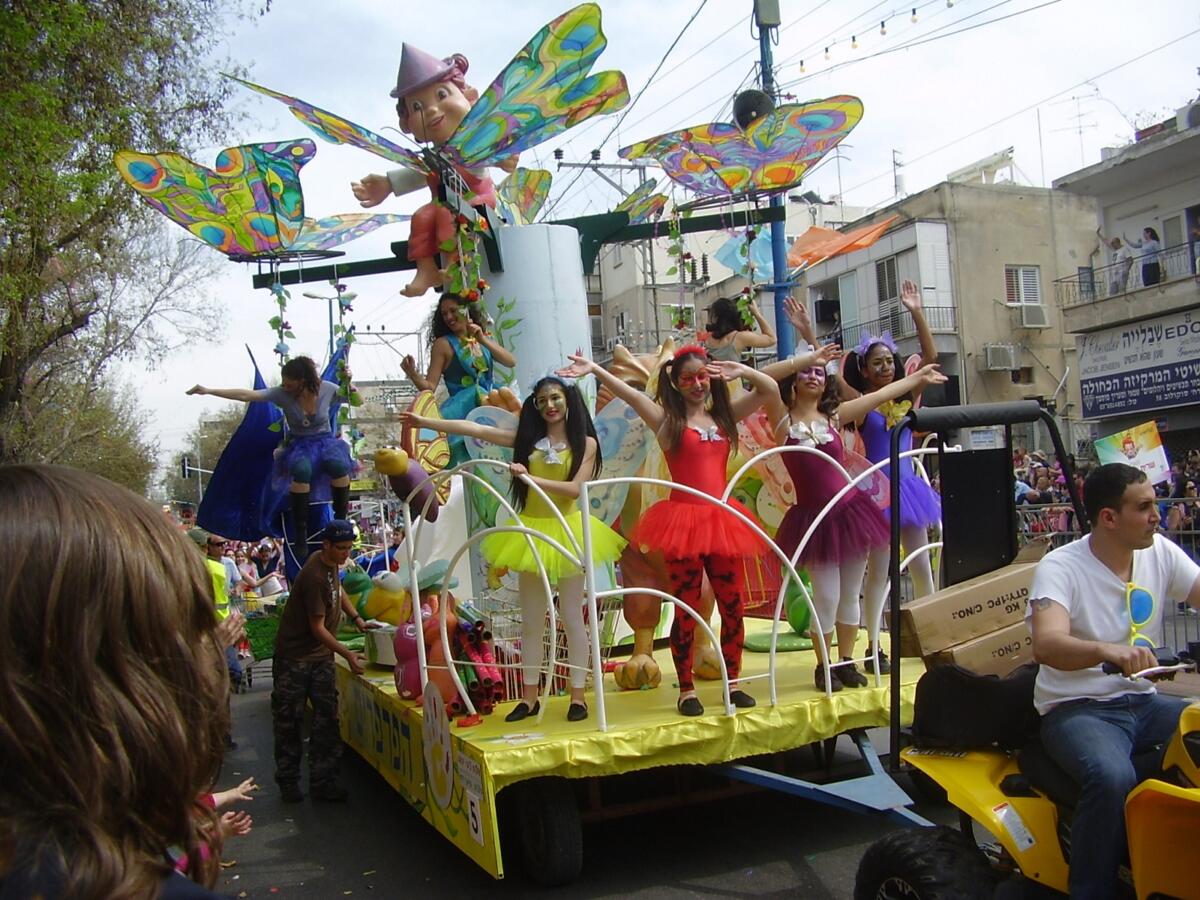Jewish communities around the world celebrate Purim as a holiday of feasting and gladness, gift-giving and tzedakah (charity), revelry and imbibing. It is one of the most popular Jewish holidays for families and children. The celebration of Purim is based on the story found in the biblical Book of Esther. A tractate of the Mishnah (and hence the Talmud) is devoted to it as well. Purim is a time when Jewish communities, like the community in the Book of Esther, become particularly aware of the fragility and even the danger of living in the Diaspora, as a people “scattered abroad and dispersed among the peoples” (Esther 3:8).
The Megillah Reading
The primary communal observance connected to Purim is the mitzvah (commandment) of reading the Book of Esther, called the megillah (the scroll). The scroll is read twice, once in the evening and once in the morning. The Megillah is in the form of a parchment scroll, handwritten like a Torah. The Book of Esther has a special cantillation used only for that book, and the reading is preceded by three blessings.
During the reading, it is customary for the congregation to drown out the name of Haman by making noise, usually using a special noisemaker called a gragger, whenever the reader utters the villain’s name. Another custom is to read the verses listing the ten sons of Haman (found in chapter 9) in one breath. One theory regarding the significance of this practice says that it is done to symbolize how the brothers all died together, while a second theory suggests that we should not draw out the reading of the names so as not to gloat over their fate.
Traditionally, an additional Torah reading, in addition to the weekly reading, is inserted on the Sabbath preceding Purim. Called Shabbat Zachor (the Sabbath of Remembrance), the additional reading is an excerpt from the Book of Deuteronomy (25:17-19) discussing the battle with Amalek. Jewish tradition views Amalek as the ancestor and in some ways the precursor of Haman. Both sought to annihilate the Jewish people, and both were thwarted in their plans.
With your help, My Jewish Learning can provide endless opportunities for learning, connection and discovery.
Besides the reading of the Megillah, the only liturgical additions for the day of Purim are the addition of the Al Hanisim, both in the daily Amidah and the Birkat Hamazon (Grace After Meals). There are a number of explanations for why Hallel is not recited on Purim as it is on other joyous holidays. Among them is the theory that on Purim, unlike on Passover or Hanukkah, the redemption is not complete. On Passover and Hanukkah, the Jews are completely delivered from a foreign king, while on Purim the Jews are still subjects of Ahasuerus. The reading of the Megillah is seen to achieve the same purpose as Hallel. Also, Hallel is generally not said for events that took place outside the land of Israel.
Fast of Esther
Another traditional feature of Purim observance is Ta’anit Esther, the Fast of Esther. It is one of the four minor fast days in the Jewish calendar. All of these other fasts are connected with tragic events related to the destruction of Jerusalem or to the loss of the Jewish state. The fast of the 13th of Adar, the day preceding Purim, is related rather to the threat to destroy the Jewish people. When Mordecai told Esther about Haman’s plan to kill all the Jews, she asked him to proclaim a three-day fast. It is in commemoration of this that some Jews still fast on this day.
There is another unique feature to communal Purim observance. Purim is celebrated in most of the world on the 14th of Adar. However, in Jerusalem it is observed on the 15th of Adar, because of the interpretation of Esther 9:18-19, “But the Jews that were in Shushan assembled together on the 13th day thereof, and on the 14th thereof; and on the 15th day of the same they rested, and made it a day of feasting and gladness. Therefore do the Jews of the villages, that dwell in the unwalled towns, make the 14th day of the month of Adar a day of gladness and feasting.” The sages concluded that Purim was celebrated on the 15th of Adar, as in Shushan, in cities that had been walled since the days of Joshua.
In a leap year, when there is the additional month of Adar II, it is traditional to do everything that must be done in Adar during the first Adar. Purim is the exception to this rule and is celebrated during the second Adar.
Mishloach Manot (Gift Baskets)
On Purim the Megillah mandates that we give gifts to friends (mishloach manot), usually of food, and to the poor (matanot l’evyonim). It is a tradition for congregations to collect money in memory of the half shekel collected in ancient days for the upkeep of the Temple. Purim is a time for carnivals and parties and masquerades. Most Jewish congregations hold special carnivals for children, and children dress in costumes that commemorate the various characters of the Purim story. They perform humorous plays called Purim shpiels, which more often than not mock both the characters in the story and leaders in the Jewish community.
Adar
Pronounced: uh-DAHR, Origin: Hebrew, Jewish month usually coinciding with February-March.
Purim
Pronounced: PUR-im, the Feast of Lots, Origin: Hebrew, a joyous holiday that recounts the saving of the Jews from a threatened massacre during the Persian period.
Torah
Pronunced: TORE-uh, Origin: Hebrew, the Five Books of Moses.



